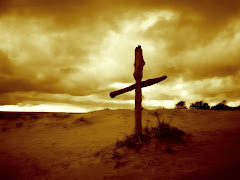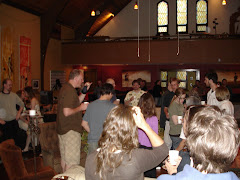So our little Yahweh Group meets two Tuesday's a month to discuss questions like
"Do Christians have to believe in atonement? Why would God have to punish some innocent person in order to pay for sin?"
"Why do Christians focus so much on Jesus' death? What about his life? Ok, so he died for our sins. But what did Jesus live for?"
"Am I a heretic if I'm not sure that Jesus' way is the only way? Can I still be a part of a Christian church like this one?"
"What exactly is salvation? I know it has to do with God saving people, but which people? And what are they saved from, exactly?"
We also read books together, like any book club I guess. But our books are theological in nature. At tonight's meeting we were wrestling with Phillip Jenkins' book, The New Faces of Christianity: Believing the Bible in the Global South. Jenkins explores the huge differences in how Christians below the equator interpret the Bible compared to American and European Christians. Tonight's chapters focused on poverty and wealth and on good and evil. Jenkins posits that evil in the third world south is an external force, universally acknowledged. We debated our various understandings of evil and whether we see evil as something outside ourselves or not. I confessed that I am reluctant even to talk about evil with those who see it as somehow separate from themselves. For example, I've never been comfortable with those who identify Russia, Iran, or North Korea as "evil empires," particularly when the people using that moniker are unwilling to acknowledge the evils we Americans have perpetrated throughout our history. Neither has it ever made any sense to me for us Christians to categorize other religions as evil or false, when we have been behind some of history's greatest injustices and tragedies, from the Crusades and the Inquisition, to the slave trade and the destruction of the Native Americans and their land.
We don't decide or accomplish much at our Yahweh Group meetings. We don't use Roberts' Rules or keep any minutes. But we sure do speak from our hearts and listen respectfully to each other. We don't hold back and we feel safe in our unusual dialogue. It feels good to be with other Christians who are wrestling with some of the same questions that I am.
We also read books together, like any book club I guess. But our books are theological in nature. At tonight's meeting we were wrestling with Phillip Jenkins' book, The New Faces of Christianity: Believing the Bible in the Global South. Jenkins explores the huge differences in how Christians below the equator interpret the Bible compared to American and European Christians. Tonight's chapters focused on poverty and wealth and on good and evil. Jenkins posits that evil in the third world south is an external force, universally acknowledged. We debated our various understandings of evil and whether we see evil as something outside ourselves or not. I confessed that I am reluctant even to talk about evil with those who see it as somehow separate from themselves. For example, I've never been comfortable with those who identify Russia, Iran, or North Korea as "evil empires," particularly when the people using that moniker are unwilling to acknowledge the evils we Americans have perpetrated throughout our history. Neither has it ever made any sense to me for us Christians to categorize other religions as evil or false, when we have been behind some of history's greatest injustices and tragedies, from the Crusades and the Inquisition, to the slave trade and the destruction of the Native Americans and their land.
We don't decide or accomplish much at our Yahweh Group meetings. We don't use Roberts' Rules or keep any minutes. But we sure do speak from our hearts and listen respectfully to each other. We don't hold back and we feel safe in our unusual dialogue. It feels good to be with other Christians who are wrestling with some of the same questions that I am.
I hope that as we move into the unknown future together, more and more Christians and people of all religions will have a chance to be a part of group like this one. It is so important that faith communities learn to embrace the questions and doubts that come with faith. Who knows? Maybe if groups like this were more prevalent within churches and faith communities, fewer people would choose to live their lives outside such communities.




















5 comments:
Thanks for this piece ... how the church has created a monolithic set of beliefs, and said, "They're absolutely true, and if you don't believe, you might just to hell ... forever!"
So we've cowed the intellect and called it sin.
We've battered the curious and demeaned those who ask questions, and we've called them "lost."
Profound dishonesty ... but God has a way of working with it, and sooner or later, the sham called Christianity is exposed, and the faith to which Jesus calls us has a chance again.
I think of the running debate and conflict between serious monasteries and the established church - early monks wanted poverty; the church loved its wealth and position.
Say Hi to the Yahweh group ... and those pics - Wow!
Please would you e-mail
melajoy@telus.net
I have something to tell you that might interest you.
I can't post it here.
Thanks very much,
Js
ps I found your link on another blogspot.
js
TOTALLY AWESOME! I am also part of a similar type of fellowship on a weekly basis (aside from other home church fellowship) and it is incredible what freedom there is to discuss spiritual matters this way and without any condemnation whatsoever. I'll tell you more about it in a private email as soon as I have chance/time! to email you in length.
Mary Ann
Post a Comment